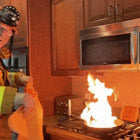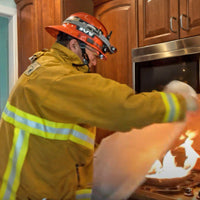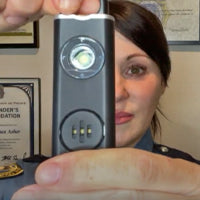Where you put your smoke detectors matters just as much as installing them. Proper placement makes sure they can detect...
Hardwired smoke detectors are a smart choice for keeping your home safe. As the term suggests, they’re hardwired to your home’s power supply. When the power’s off, they have a backup battery that keeps them running.
But how exactly do they work? Do they really keep your home safe? If so, how long do they last? Are they better than battery-powered detectors? Find out below.
What Is a Hardwired Smoke Detector?

A hardwired smoke detector is connected directly to your home’s electrical system, so it gets a steady supply of power. Unlike battery-only smoke detectors, it won’t stop working when the battery dies.
Hardwired smoke detectors are also interconnected. This means that other alarms in the system go off once one detects smoke. This is crucial for bigger homes and buildings where a fire could start anywhere.
A hardwired smoke detector has three main wires: black for power, white for neutral, and red for linking the alarms together. When one unit senses smoke, it sends a small signal through the red wire and triggers other connected alarms. A single system can usually involve up to a dozen detectors.
While it mainly runs on your home’s electricity, a hardwired smoke detector has a backup battery. Thanks to this, it works during power outages. Smoke alarms in the system could be ionization smoke detectors, photoelectric smoke detectors, or both. Find out more about the types of smoke detectors here.
Some systems can also connect to home monitoring services, so you receive alerts while you’re away. It’s a simple yet reliable way to warn everyone in time.
What Are the Benefits of a Hardwired Smoke Detector?

Hardwired smoke detectors are a popular choice for home safety. Here are the reasons why they’re a smart option:
Enhanced Reliability
Hardwired smoke detectors directly connect to your home’s electrical system, so they have a steady power supply. Plus, they include backup batteries that keep them working during power outages. Pair them with a fire safety kit with fire blankets, fire sprays, and flame shields for extra peace of mind.
Do you want reliable, easy-to-use, and affordable tools to put out small fires before they spread? Check out Prepared Hero’s fire prevention tools here, and get up to 51% off on certain items.
Interconnectivity
One big plus is that hardwired detectors can link together. When one alarm detects smoke, all the others in your home go off, too. This is extremely useful in bigger or multi-story houses and buildings. Everyone hears the alert right away, no matter where they are.
Less Maintenance
Hardwired detectors need less frequent battery changes since they mainly run on electricity compared to battery-only alarms. This means fewer annoying chirps and less hassle for you.
Safety Compliance
Hardwired smoke detectors are required in new buildings or renovations. Installing them helps you follow safety rules and could even boost your home’s resale value or lower insurance costs.
Why Is My Hardwired Smoke Detector Beeping?

A hardwired smoke detector beeps for many reasons, and most of them are easy to fix. One of the most common causes is a low backup battery. Even though the unit runs on your home’s electrical power, it has a backup battery that powers it during outages. When that battery is weak, the detector will chirp every minute or so until it’s replaced.
Dust and debris can also trigger beeping by interfering with the sensors. Giving the unit a gentle cleaning with a vacuum or soft cloth can help. Sometimes, the beeping happens after a power interruption, such as a brief outage or a tripped breaker.
In other cases, the detector beeps because it’s at the end of its life. Most smoke detectors last up to 10 years, and an aging unit will beep to tell you it’s time for a replacement. Plus, loose wiring inside the unit or in the electrical connection can also cause intermittent chirping. If the beeping continues after replacing the battery and cleaning the detector, check the wiring or consider replacing the device.
Addressing the issue keeps your alarm working and protects your family. Find out more about why your hardwired smoke detector beeps here.
How Do I Stop My Hardwired Smoke Detector From Beeping?
Check the backup battery, clean out any dust, reset the alarm, or replace the unit (if it’s old) to stop your hardwired smoke detector from beeping.
First, check the backup battery. Even though the detector runs on your home’s power, the battery helps during outages. If it’s low, open the cover, take out the old battery, and replace it with a new one. After that, press the test button to see if the beeping stops.
If it keeps going, try cleaning the detector next. Dust and dirt can build up inside and block the sensor. This causes false alarms or constant beeping. Use a soft brush or a vacuum to gently clean the outside and vents.
In some cases, the alarm will continue beeping after changing the battery and cleaning it. This could be because of leftover power in the system. To fix this, remove the battery and hold the test button for about 15 seconds to drain any residual charge. Then, put the new battery back in and test it again.
If none of these steps work, your detector might just be old. Most hardwired smoke detectors last around 10 years. If yours is older than a decade, replace it as soon as possible.
Is It Better to Hardwire a Smoke Detector?

Hardwired smoke detectors are often the better choice because they are more reliable and offer more coverage. They connect to your home’s electricity, so they always have power. If the power goes out, their batteries take over.
Plus, they are usually interconnected, which means all detectors get triggered when one detects smoke. The instant, wide alert gives people in huge homes and buildings enough time to act.
While hardwired smoke detectors are often better than battery-powered ones, they are more expensive. They also come with a hefty installation cost, especially in older homes with outdated wiring. False alarms caused by electrical issues are a thing as well.
On the other hand, battery-powered detectors are more affordable and easier to install. However, they rely on batteries, which need to be replaced. For most people, the extra reliability, coverage, and safety of a hardwired smoke detector make it worth the investment.
What Are the Drawbacks of a Hardwired Smoke Detector?
Hardwired smoke detectors are reliable but have some drawbacks. For one, installing them is expensive because you need a professional electrician to do the wiring. This can be a hassle, especially in older homes that need extra work or new wiring before installation.
These detectors can also cause false alarms if there are power fluctuations or electrical issues. Sometimes, the alarms might beep intermittently to warn you of power loss during power outages, which can be annoying.
They need to be maintained, too. You still have to replace the backup batteries from time to time to make sure they work when the power goes out.
Updating or adding new hardwired detectors in an existing home can be tricky and disruptive as well. Plus, older hardwired systems might not work well with newer models, which could mean replacing the whole system if you want to upgrade.
Do Hardwired Smoke Detectors Require Batteries?

Yes, hardwired smoke detectors do need batteries as a backup, even though they’re hooked up to your home’s electrical system. The battery keeps the alarm working during power outages, so you’re always protected. Most units use a 9-volt battery or a sealed lithium battery.
You usually need to replace the battery every six months to a year, depending on the model. When the battery is low, the detector will usually chirp to let you know it’s time for a new one. Plus, even if the battery is sealed and long-lasting, experts recommend replacing the whole smoke detector every 10 years to make sure it stays reliable and effective.
Which Is Better, Wireless or Hardwired Smoke Detectors?
The better option between wireless and hardwired smoke detectors depends on your needs and your home. Hardwired detectors directly connect to your home’s electrical system and usually have backup batteries. They’re reliable and suit bigger homes and buildings because when one goes off, all alarms sound at once. But installing them takes time, needs an electrician, and can be disruptive since wiring runs through walls or ceilings.
Wireless smoke detectors, on the other hand, communicate with each other using radio signals. They’re battery-powered, easier to install, and don’t require wiring or drilling into walls. This makes them perfect for older homes, rentals, and places where running wires is tricky. Plus, some wireless models can connect to your phone and give you alerts even when you’re away. The downside? The batteries need to be replaced at least once a year, and wireless signals can sometimes be affected by interference or weak coverage.
Wireless and hardwired smoke detectors are both reliable when maintained properly. But if you value convenience and flexibility, go wireless. If you want a more permanent, stable setup, hardwired might be better.
Do I Need an Electrician to Replace Hardwired Smoke Detectors?

Yes, you need an electrician to replace hardwired smoke detectors. You can replace a hardwired smoke detector yourself, but it’s not the best idea. It’s complicated and involves working with your home’s electrical wiring, which can be risky if you’re not experienced.
On the flip side, an electrician knows how to handle the wiring safely, follow code requirements, and make sure the detector works as it should. A wrong connection could stop the alarm from working or even cause a fire hazard. So, it’s better to have a qualified electrician do the job for your safety and peace of mind.
How Long Do Hardwired Smoke Detectors Last?
Hardwired smoke detectors can last up to ten years. They're directly connected to your home's electrical system and have backup batteries that work during power outages. The said batteries last one to two years.
Over time, the sensors inside the detector get less sensitive because of dust, debris, and other things in the air. That’s why experts recommend replacing the whole unit every 10 years, even if it seems to work.
You can usually find the manufacturing date inside the detector to know when to replace it. If you don’t see one, it’s safer to just get a new detector. Plus, test your smoke detectors every month to make sure they’re working well. Change the backup batteries regularly so your detector stays reliable during power outages.
Why Are Hardwired Smoke Detectors More Expensive?

Hardwired smoke detectors are more expensive because of the installation process. Unlike battery-operated alarms, hardwired detectors call for a certified electrician to connect them to your home’s electrical wiring. This can involve running wires through walls or ceilings, which takes time and effort. If your home’s wiring is old, you might need electrical upgrades, which adds to the cost.
Another reason is the interconnectivity feature. Hardwired detectors can link together, so if one alarm senses smoke, all alarms in the house sound off. This is great for safety, but makes installation more complex and costly.
Plus, electricians who install these systems often charge higher rates, especially if the job requires extra work or troubleshooting. While the detectors themselves might not be that expensive, the professional labor, wiring, and extra features make hardwired smoke detectors more expensive overall.
Conclusion
Hardwired smoke detectors are a reliable way to keep your home safe. They use your home’s power and have a battery backup, so they work even during outages. Plus, having interconnected alarms means everyone gets an alert fast.


 Fire
Fire Safety
Safety Survival
Survival Protection
Protection New
New
 Fire
Fire Safety
Safety Survival
Survival Protection
Protection New
New












